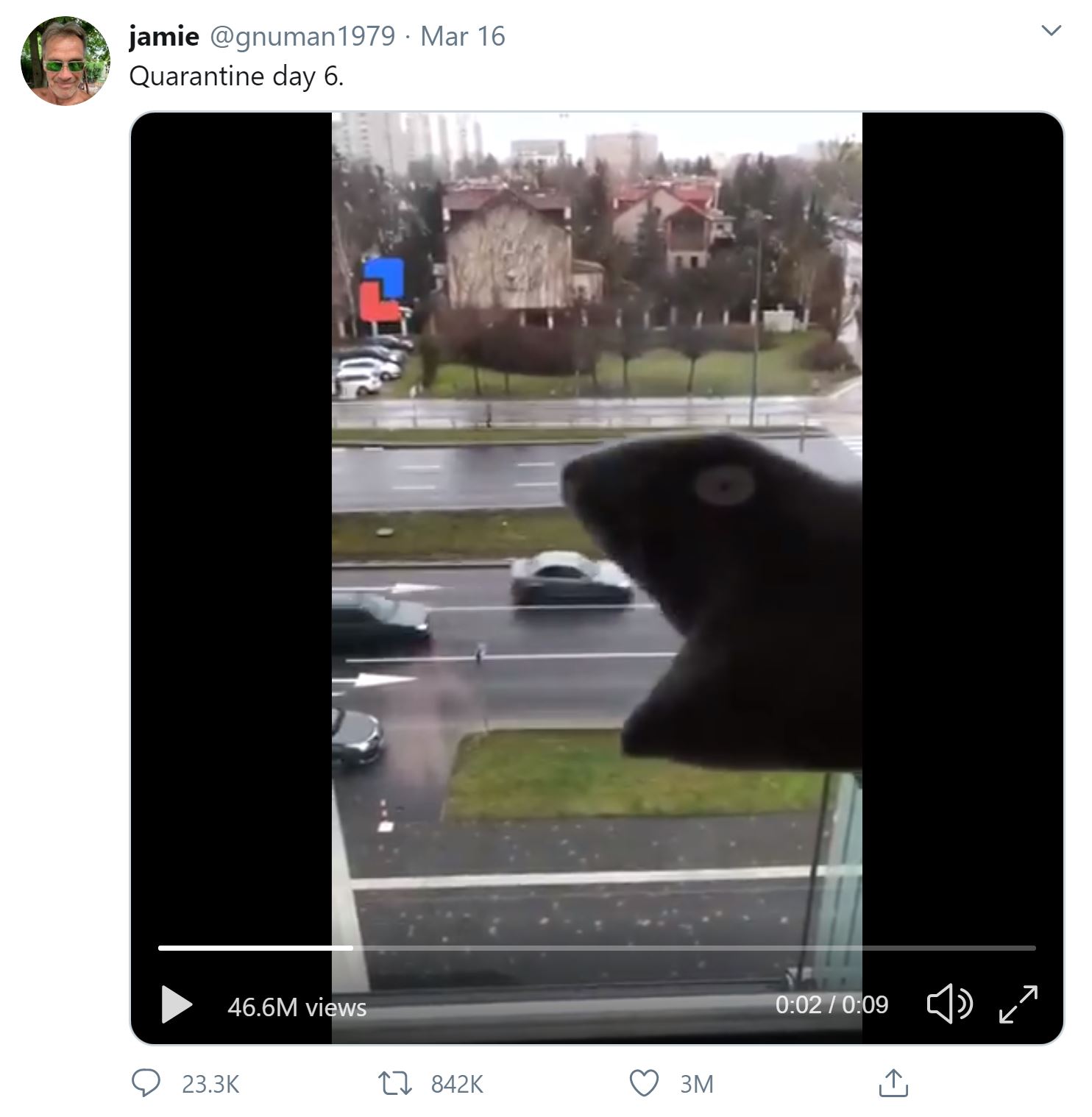
No one can really predict how the world will look after the COVID-19 pandemic. But if you could write one email that had the potential to help change the world for the better, would you do it?
Recent weeks have made it clear how much we are all connected and that we are all in this together. With the panic buying of toilet paper, it has also highlighted many societies have become a too self-absorbed – pardon the pun! We are certainly at a unique point in our collective history. While we are in a time of social-distancing, self-isolation or even quarantine, how can we use this to let our respective governments know that we expect to emerge from this global crisis with a better and fairer world? And that fairness needs to extend wildlife and the natural world.
Until now, many of us have been caught up in the day-to-day noise, but now the noise is going or has gone; we have time to think and some of us have time to do some really useful stuff!
While I know many people are struggling with their daily survival and others, sadly, will be dealing with the death or illness of loved ones. For many, self-distancing and quarantine are leaving us with time on our hands, and possibly cabin fever – Jamie’s quarantine day 6 did make me smile.
For those of you who would like to use this time to make a difference for wildlife, Donalea Patman of For the Love of Wildlife (Nature Needs More’s collaborative partner on the CITES modernisation project) and I are inviting you to join us; together we can make a real difference for wildlife, if enough of people around the world are happy to write just one email. We would both love to say that COVID-19 will trigger a change in the world that means the legal (and illegal) wildlife trade would be closed permanently; our preference would be a world were wildlife is protected and not traded. But we know that once we are out of the health crisis businesses around the world will lobby their governments to re-open the legal trade and in all likelihood governments will comply with their wishes, on the basis that they need to quickly rebuild the economy.
So we have to be pragmatic.
In 2018, after years of researching and working on the demand for illegal wildlife ‘products’, For the Love of Wildlife and Nature Needs More came to the conclusion that the illegal trade can not be tackled until the loopholes in the legal trade in endangered species are closed. CITES needs modernising to cope with current trade volumes. COVID-19 is a result of both the legal and illegal trade in wildlife; the lack of questioning of the sustainable-use model and the opaque system facilitating international trade means that that before the pandemic precious little was known about China’s 22,000 legal captive breeding facilities. But China is just a microcosm of the world; the legal trade has been encouraged and allowed to flourish, unchecked, worldwide.
Business doesn’t like the idea of transparency, opaqueness in their operations allows plausible deniability and means it is difficult for them to be held to account for bad behaviour. Decades of highly successful campaigning has convinced too many in our societies that any regulation is inherently bad for the economy. The result is decades of under-investment in modernising the global systems that manage transparency, and just one of those systems is the one that manages the legal trade in endangered species, CITES. We are now paying for this with COVID-19, but wildlife and the natural world has paid for this because for too long, too few have recognized that they are being legally traded to extinction.
Help us to modernise the CITES system, which facilitates the legal trade in endangered species. Send an email to your MP or political representative to let them know that you want the system that manages the legal trade in species to be modernised to an electronic permit system, which is fully integrated with customs, to ensure traceability from source to destination. This long overdue, particularly since the current, archaic system makes it easy to launder of illegal items into the legal marketplace and impossible to address biosecurity risks.
We have written the email (below) and all you have to do is copy and paste it into an email to your email to your MP or political representative. If you are unsure if your country is a signatory to CITES follow the link, for a list of all the 183 CITES signatory parties. For those in Europe, don’t forget to also write to the European Parliament, which plays a key role in the legal trade of endangered species within the EU. We hope that you will join us, by writing this one email you can make a huge difference for both people and wildlife.

We know that this email is a long and technical, but we don’t want to give your MP any wriggle room! The email states clearly: what you want, the time-frame for action and your expected response.
To continue to keep this critically important issue front of mind with politicians, we ask that you share the response you receive. The first email is likely to be an automated email saying that they’ll get back to you but what we’re wanting to see is the response to the issues raised in your email – these can take anywhere from a few days to a few weeks to receive. You might get the generic statements about the government’s current commitment to tackling the illegal wildlife trade or following all its CITES signatory obligations, even though the letter makes it clear that’s not what you are asking about. Keep pushing them until they address your specific questions.
Share the response on social media using the hashtag #getitdone #maketradetransparent #CITESfitforpurpose; tagging your MP so they know that we’re all serious about immediate and real action.
If you have any questions about the email that you would like answered before you send it, you can contact:

Lynn: lynn@natureneedsmore.org

Donalea: donalea@fortheloveofwildlife.org.au
Our thoughts are with you and your families in the days, weeks and months to come. Thank you for all your interest in and support of our work on behalf of endangered species.
Dear…
The current unprecedented coronavirus pandemic has brought the dangers of the legal breeding, trading and consumption of exotic wildlife into stark focus. In this, China is just a microcosm of the world, similar wildlife breeding facilities and markets exist in many countries, including throughout Asia, Africa and Latin America. The legal trade in exotic wildlife is both global and massive. The reason we do not know the exact origin of the novel coronavirus is because this trade is poorly regulated and largely unmonitored, putting populations across the globe at continued risk of zoonotic diseases. Unless we change this state of affairs, the next pandemic is a virtual certainty.
Epidemiologists and immunologists have continued to ramp up their research over the last two decades with the expectation of the increasing risks of zoonotic diseases. Paradoxically, over the same timeframe, the legal trade in exotic species has been encouraged and supported to grow, increasing the probability of an outbreak even further.
Attention may now be on China, but it is the global business and trade community that has shown no leadership in modernising the system that facilitates and monitors this worldwide legal trade in endangered species – the Convention on International Trade in Endangered Species of Wild Fauna and Flora (CITES). Given no leadership has been shown at the international level, it is no surprise that individual countries and national governments have not invested in modernising domestic systems and legislation.
In response to COVID-19 many governments are likely to put in place better domestic regulations to handle the obvious biosecurity risks, but this is insufficient if we don’t address the global trade component. The primary purpose of CITES is to ensure that the international legal trade in endangered wild animals and plants does not threaten their survival, but it is also the only vehicle to address the issues of traceability, risk management, monitoring and shutting down the illegal trade.
In this respect, I was shocked to hear that the CITES system has not been modernised since it entered into force in 1975. A 1970s paper-based system is still used to facilitate and monitor the international legal trade in endangered species. Decades of under-investment are at odds with the value of the legal trade, estimated to be over US$320 Billion annually. Upgrading the CITES legal trade platform to a modern, digital, real-time system has been discussed for a decade, but almost no progress has been made. There now can be NO excuse for the international community or any individual country to maintain this obsolete legal trade monitoring and management system.
The transition to an electronic permit system, which is fully integrated with customs, to ensure traceability from source to destination, is long overdue, particularly since this archaic system makes it easy to launder of illegal items into the legal marketplace and impossible to address biosecurity risks. Therefore, it is critical that any electronic permit system is secure and trustworthy.
What makes this lack of progress even more shocking is that a system has been designed, the eCITES BaseSolution, developed jointly between CITES, UNCTAD and with the support of the Swiss and Sri Lankan Governments and it is ready for global rollout. Yet, to-date, Sri Lanka is the only CITES signatory country to implement this system and this needs to change. At a cost of US$150,000 per country, this is loose change compared to the global economic crisis set in train by COVID-19 (setting aside the tragic loss of life).
Rolling out the eCITES BaseSolution over all 183 CITES signatory parties will cost US$30 Million in total and technical it only takes 6-12 weeks to implement this system in each country; the world just needs the political will to do this. For a legal trade worth over US$320 Billion annually, these roll-out costs are minimal.
Wealthy countries should make it part of their COVD-19 response to provide the funding for developing countries to implement electronic permitting. Such donations can be made via the World Bank’s Global Wildlife Program with the stipulation it is for the immediate roll-out of the eCITES BaseSolution to help minimise the risk of zoonotic diseases in the future.
The handful of countries that have already implemented a domestic electronic permitting system need to demonstrate that their systems are secure, trustworthy. They also need to commit to covering the costs of interoperability with the eCITES BaseSolution as this system incorporates species names, appendix listings, units and classifications in accordance with CITES rules and can be centrally updated, ensuring consistency in global electronic permit exchange.
It seems absurd that decades of funds and research have gone in to preparing for a response to increased risks of zoonotic diseases, yet in the age of big data and instant global communication, CITES really does operate in a way unchanged from the 1970s; this must be immediately addressed. Modernising the CITES legal trade permit and management system will make supply chains more transparent and helps to address the biosecurity risks inherent in any trade in exotic wildlife.
As my local MP/representative, I request that you seek support from our government and the responsible department, to implement, as a minimum, the eCITES BaseSolution not only in our own country, but across all CITES signatory parties by the next CITES Conference of the Parties, held in Costa Rica in 2022. Similarly, I ask that our government pushes for interoperability and electronic permit exchange to ensure real-time trackability from source to destination in this international, legal trade system.
I understand that there is a CITES Standing Committee meeting (CITES SC73) scheduled for late 2020. My request is that our government joins forces with other governments around the world to ensure the appropriate submissions are made to CITES SC73 for a resolution such that, as a minimum, the eCITES BaseSolution is rolled out cross all CITES signatory parties by CoP19 in Costa Rica in 2022.
I look forward to a response addressing the precise points raised in this email. Please note, I am interested in a ‘real’ response to the specific issues outlined; I am not interested in a response consisting of banal statements about the government’s current commitment to tackling the illegal wildlife trade or following all its CITES signatory obligations. The COVID-19 global crisis shows a business as usual approach is not possible or acceptable.
Yours…

